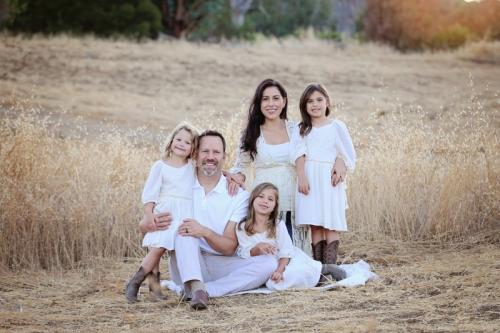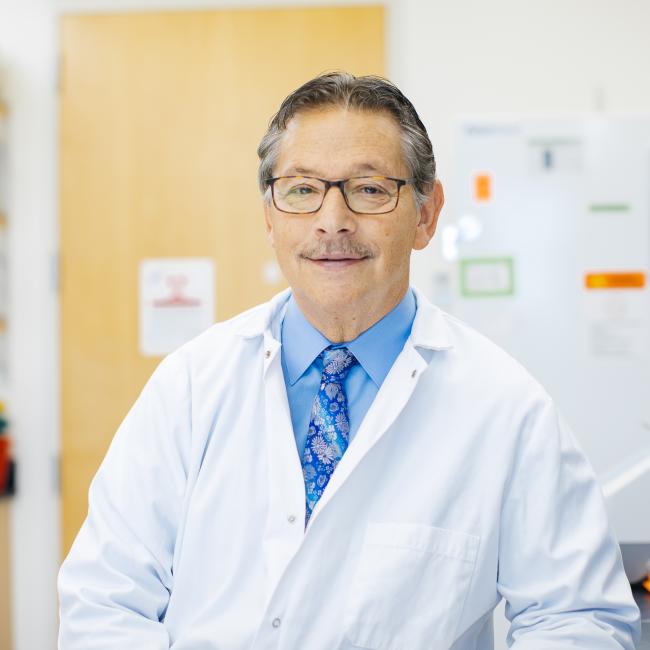
From U Magazine: Savoring life outside the bubble
On a pre-COVID-19 afternoon, the three sisters giggle as they careen, side-by-side-by-side, down a wavy carnival slide. Seven-year-old fraternal twins Annabella and Evangelina sandwich their 5-year-old sister Gigi. The plastic mats the girls sit on as they descend, scuffed and dirt-stained, attest to their heavy usage by other delighted children.
Once, this carefree scene would have been unimaginable. Evangelina was born with a rare genetic disorder called adenosine deaminase (ADA) deficiency, which causes severe combined immunodeficiency (SCID). Her body lacked the adenosine deaminase enzyme that immune cells require to fight infection. SCID left her vulnerable to illnesses that healthy people shrug off easily. Even a minor cold could have been fatal.
Thanks to a novel gene therapy treatment Evangelina received from Donald B. Kohn, MD, professor of pediatrics and of microbiology, immunology and molecular genetics and a researcher in the Eli and Edythe Broad Center of Regenerative Medicine and Stem Cell Research at UCLA, Evangelina now has a fully functioning immune system. Today, she is no more vulnerable to illness than any other healthy child her age.
Funding from The Eli and Edythe Broad Foundation has made work such as Dr. Kohn’s possible. In addition to UCLA, The Broad Foundation has namesake stem cell research centers at UC San Francisco and the University of Southern California, elucidating their commitment to this important work.
“Stem cell research has advanced in significant ways since our initial investment over a decade ago, and we are encouraged by stories like Evangelina’s,” says Gerun Riley, president of the Broad Foundation. “We are proud of the scientists committed to research informing life-changing medical breakthroughs that will impact lives around the world.”
On another pre-COVID-19 afternoon, Evie — a nickname bestowed by Dr. Kohn — sat atop a horse, guiding the stately animal around orange cones under the watchful eye of her instructor.
Evie and Annabella, who live in Corona, California, take weekly horseback riding lessons. “It’s nothing too fancy right now — just getting comfortable on the horse and controlling the horse on their own,” says mother Alysia Padilla-Vaccaro. “If you can control an animal that size, it builds confidence.”
The first-grader’s days brim with activities. In addition to riding, Evie takes piano (she’s currently working on “Let It Go” from Frozen) and tennis lessons. “She’s got a pretty good backhand,” her mother says. “And she’s very competitive.”
While the novel coronavirus pandemic halted her regular activities, Evie kept busy during quarantine, walking with her mother and sisters to visit their grandparents, who live nearby and have a six-acre citrus grove. “It’s free-range for them to just walk around and explore and not have to be concerned about avoiding people. It’s really their own private park, so we’re very lucky,” Padilla-Vaccaro says.
While the Padilla-Vaccaros have remained vigilant about the novel coronavirus, they are grateful for Evie’s now-healthy immune system. “She was gifted a fighting chance against COVID-19,” her mother says.
Padilla-Vaccaro recalls how Evie’s condition more than prepared her and Christian to guard against the current viral threat. In the early months after Evie’s diagnosis, long before the pandemic, the couple required their few visitors to follow a strict cleanliness regimen: Wear only freshly laundered clothes; remove and clean watches and cell phones; don gowns, masks and gloves; no visiting within 10 days of traveling by plane or within three weeks of being sick. Now, even though no visitors are allowed in their home due to the pandemic, the family knows how to protect themselves.
Because of their lack of immune-system function, babies with SCID must remain isolated in clean, germ-free environments until they can receive treatment. Once an invariably fatal condition, SCID is sometimes referred to as “bubble-baby disease,” recalling David Vetter, the “boy in the bubble” who spent his 12 years of life in plastic isolation before dying in 1984.
Today, children with SCID have two treatment options. Bone marrow transplant, in which patients receive healthy stem cells from a matched donor, is the most common treatment. However, only a small percentage of infants find matches and the transplant carries the risk of graft-versus-host disease. The alternative, twice weekly injections of ADA, fails to confer full levels of immunity.
Evangelina benefited from a third option offered by Dr. Kohn and the UCLA Broad Stem Cell Research Center, where a clinical trial was underway to genetically reprogram the immune system of babies with ADA-SCID. The procedure involved removing the baby’s own blood-forming stem cells, inserting the gene responsible for making adenosine deaminase enzyme and then transplanting the corrected stem cells back into the baby.
The experimental procedure proved successful for Evie and more than 50 other infants who have now received this treatment at UCLA.
“Science is such a gift,” Padilla-Vaccaro says. “I am so grateful to UCLA, to Dr. Kohn, to the Broads for funding the Stem Cell Research Center and to the California Institute for Regenerative Medicine (which has funded some of Dr. Kohn’s research). UCLA has given me my daughter's life. They’ve given my daughters their sister and my mom and dad their grandchild.” Her eyes begin to tear. “They’ve given me my everything."
